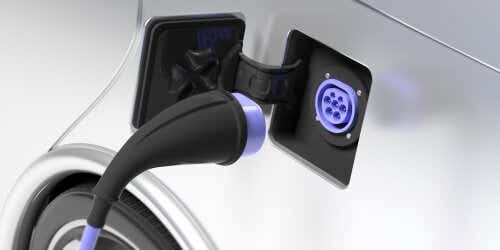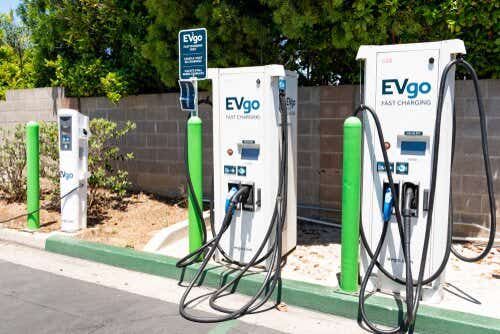Charging points not showing? Try zooming in or out.
Where can I charge my electric car?
There should be at least a couple of EV charging points where you can charge your electric car at most places you’d park and leave the vehicle for an hour or two, especially in town centres. Some common locations for public charging points include supermarkets, leisure centres, multi-storey car parks and so on.
How much does it cost to charge an electric car at a charging station?
The cost of charging an EV at a charging station depends largely on the type of charger - whether it’s a fast or rapid charger - and the company that operates it, so it can vary. It shouldn’t be prohibitively expensive, not least because some drivers will rely exclusively on those charging stations. Some electric car charging points cost nothing, though it’s likely you’ll be paying in another way - for instance, to park in a car park or to use a leisure centre.
How to use EV charging stations
Using EV charging stations couldn’t be easier - you just need to make sure the connector type for your car matches the one on the EV charging station. Fortunately, you can see which type of connector is required on the Uswitch map above. Some can be paid for using standard contactless payment methods, but others may require you to have an account with the charging station operator.
Types of EV charging station
Public EV charging stations will provide either fast or rapid charging as they’re designed to be used quickly. The table below provides a general overview of charging times and connector types at most fast and rapid charging stations.
| Type | Speed | Charging time | Connectors |
|---|---|---|---|
| Fast charging | 7-22 kW | 4-6 hours | Type 1 - 22 kW (5-pin); Type 2 - 22 kW (7-pin) |
| Rapid charging | 43-50 kW | 30 mins-1 hour | Type 2 - 43 kW AC (7-pin); CHAdeMO - 50 kW DC (4-pin); CCS - 50 kW DC |
Which supermarkets offer free EV charging?
Supermarkets are a common location of public charging points for EVs. If they have car parks attached, most customers will park for forty minutes to an hour while they do the weekly shop, which is a perfect amount of time to top up an EV battery.
Which supermarkets offer free EV charging, though?
Is electric car charging free at Tesco?
In partnership with Volkswagen and Pod Point, Tesco has rolled out 500 free electric vehicle charging stations in car parks at Tesco Extra and Superstore car parks across the country. 400 of these charging points charge at 7 kW, while the other 100 charge at 22 kW and 50 kW (though these require a small fee to be paid).
Is Asda electric car charging free?
Asda electric car charging was free between May 2021, when a partnership with Engie saw the rollout of 50 kW chargers across 19 locations in West Yorkshire, and October 2021. While those chargers are still in place, they now require a fee to use.
How much does it cost to use Sainsbury’s electric car charging points?
The electric car charging points at Sainsbury’s stores charge at a rate of 7 kW and are free to use for customers.
Is Waitrose EV charging free?
A widespread rollout of electric vehicle charging stations at Waitrose stores across the country is currently underway, with 800 Shell Recharge charging points due to be installed in 100 locations. Each site is expected to have six 22 kW and two 50 kW charging points. It’s likely that, as these are part of the Shell network which does generally charge drivers, the Waitrose chargers will also ask drivers to pay to use them.
Are Aldi EV chargers free?
Aldi has partnered with Shell NewMotion to install free-to-use 22 kW EV chargers at all its new UK stores - this will see 140 chargers installed.
What does it cost to charge an EV at Lidl?
Since 2017, Lidl has been partnered with Pod Point to install EV charging stations at 228 stores across the UK. The charging stations charge at 22 kW and 50 kW and cost 26p per kWh as of October 2021.
Electric charging stations FAQs
Are electric car charging stations free?
Some electric car charging stations are free, but they will usually be in places you’d pay to park in anyway, like a public car park or somewhere like a cinema or leisure centre that you’d be paying to get into.
How are electric car charging stations powered?
While electric car charging stations supply electricity to your vehicle, that electricity will be supplied by the grid - the same as the electricity we use in our houses. The way that electricity is generated can vary, and presents a potential issue in the overall greenness of our EV use. If the electricity we use in our cars comes from non-renewable sources, it undermines our desire to lessen our impact on climate change. While there’s no way of being able to tell where the electricity you top up with at a public charging station comes from, it’s something to be aware of and something you can try to offset by ensuring your home electricity comes from renewable sources.
Who manufactures electric car charging stations?
There are multiple manufacturers and operators of electric car charging stations in the UK. These include:
The Tesla Network
Instavolt
Shell Recharge
Pod Point
BP Pulse
Ionity
Genie Point
Engie
Charge Your Car
How fast are public charging stations?
Public charging station speeds vary depending on the charging rate they offer. For instance, if a station charges at 7 kW, that would offer up to 30 miles per hour of charging - a 22 kW charger would offer up to 90 miles. Times will also vary depending on the car, battery capacity and onboard charging rate. Rapid chargers offer the quickest way to charge an EV battery, as long as the car can handle it - they can get the battery from empty to 80% full in as little as 20 minutes.
How long does it take to charge an EV at a public charging point?
The length of time it takes to charge an EV at a public charging point varies depending on the amount you need to charge, your car battery size and the speed of the charger you’re using.
How many EV charging points are there in the UK?
As of the end of March 2022, Zap Map says there were 30,412 EV charging points across the UK (in 19,150 locations).
Do petrol stations have electric car charging stations?
Some petrol stations have electric car charging stations that sit separately from fuel pumps. These can be found on Uswitch’s EV charging station map.
Is it cheaper to charge an EV at home?
Yes - it should always be cheaper to charge an EV at home than by relying on public charging points, especially if you’re taking advantage of an EV-specific tariff which allows for cheaper charging overnight.
Do I need a connector to charge at a public charging station?
Some public EV charging stations will be tethered, which means they have cables attached to them that drivers can use to connect to their cars. Some will be untethered, which means drivers have to make sure they have their own cables in the car to connect to the charging station. This is good practice for drivers anyway - in the same way that you carry a spare tyre just in case, you should always carry a spare charging cable.



